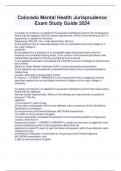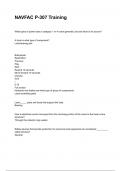Colorado Mental Health Jurisprudence Exam Study Guide 2024 To qualify for licensure, an applicant must present satisfactory proof to the Acupuncture Board that the applicant has met certain requirements. Which of the following is NOT a requirement to qualify for licensure: References: 205.203, Occ. Code; Board Rule 183.4(a) A) the applicant has an associate degree from an accredited community college or a four-year college or university; B) the applicant is a graduate of an acceptable approved acupuncture school or received and completed training which, in the opinion of the Acupuncture Board, was substantially equivalent to training provided by such a school; C) the applicant has taken and passed the CCAOM (Council of Colleges of Acupuncture and Oriental Medicine) Clean Needle Technique (CNT) course and practical examination; D) the applicant has successfully completed 60 semester hours of general academic college level courses, other than in acupuncture school. E) None of - CORRECT ANSWER -It is not a requirement that an applicant have an associate degree from an accredited community college or a four -year college or university. To qualify for licensure, an applicant must present satisfactory proof to the Acupuncture Board that the applicant has met certain requirements. Which of the following are requirements to qualify for licensure? That the applicant: (1) is at least 21 years of age; (2) has taken and passed, within three attempts, each component of the full National Certification Commission for Acupuncture and Oriental Medicine (NCCAOM) examination; (3) is able to communicate in English; (4) has successfully completed 90 semester hours of general academic college level courses, other than in acupuncture school. - CORRECT ANSWER -To qualify for licensure, an applicant must present satisfactory proof to the Acupuncture Board that the applicant is at least 21 years of age; has taken and passed, within three attempts, each component of the full National Certification Commission for Acupuncture and Oriental Medicine (NCCAOM) examination; and is able to communicate in English. Which of the following is NOT sufficient to demonstrate ability to communicate in English? References: Board Rule 183.4(a)(8) A Graduation from an acceptable approved school of acupuncture located in the United States or Canada; B An associates degree from an accredited community college or four -year college or university; C Passage of one of the four English language tests specified in the rules of the Medical Board; D At the discretion of the Acupuncture Board, passage of any other similar (to the four tests specified in the rules), validated examination testing English competency given by a testing service with results reported directly to the Acupuncture Board; E None of the above. - CORRECT ANSWER -An associates degree from an accredited community college or four -year college is not sufficient to demonstrate ability to communicate in English. The jurisprudence examination is to cover which of the following subjects? (1) Policies of the Texas Acupuncture Board and the Texas Medical Board applicable to the professional practice of acupuncture in this state and, in special circumstances, neighboring states; (2) Texas licensing requirements and other laws, rules, or regulations applicable to the professional practice of acupuncture in this state. References: 205.203(c -1), Occ. Code; Board Rule 183.4(a)(7) A (1); B (2); C (2) and the licensing requirements for states bordering Texas; D (1) and (2); E None of the above. - CORRECT ANSWER -The jurisprudence examination is to cover Texas licensing requirements and other laws, rules, or regulations applicable to the professional practice of acupuncture in this state. What is outside the scope of practice of a person licensed to practice acupuncture in Texas? (1) moxibustion; (2) insertion of acupuncture needle; (3) the administration of thermal or electrical treatments; (4) prescribe dangerous drugs or controlled substances. References: 205.001(2), Occ. Code; Board Rule 183.2(4) A (1); B (2); C (3); D (4); E Recommendation of dietary guidelines, energy flow exercise, or dietary or herbal supplements in conjunction with (1),(2) or (3). - CORRECT ANSWER -An acupuncturist may not prescribe dangerous drugs or controlled substances under an acupuncture license. Which of the following are grounds for license denial or disciplinary action by the Board? The acupuncturist: (1) drinks moderately in the evening and is not impaired the following morning when the acupuncturists sees patients; (2) has a one -time arrest for driving while intoxicated; (3) intemperately uses drugs or intoxicating liquors to an extent that, in the opinion of the Board, could endanger the lives of patients; (4) is unable to practice acupuncture with reasonable skill and with safety to patients because of illness, drunkenness, or excessive use of drugs, narcotics, chemicals, or any other type of material or because of any mental or physical condition. References: 205.351, Occ. Code A (1) and (2); B (2) and (3); C (2) and (4); D (3) and (4); E None of the above. - CORRECT ANSWER -The Board has grounds for license denial or disciplinary action against an acupuncturist who intemperately uses drugs or intoxicating liquors to an extent that, in the opinion of the Board, could endanger the lives of patients; or is unable to practice acupuncture with reasonable skill and with safety to patients because of illness, drunkenness, or excessive use of drugs, narcotics, chemicals, or any other type of material or because of any mental or physical condition. Which of the following are grounds for license denial or disciplinary action by the Board? The acupuncturist: (1) fails to practice acupuncture in an acceptable manner consistent with public health and welfare; (2) violates the Acupuncture Act or a rule adopted under the Acupuncture Act; (3) engages in unprofessional or dishonorable conduct that is likely to deceive, defraud, or injure a member of the public. References: 205.351, Occ. Code A (1); B (2);





